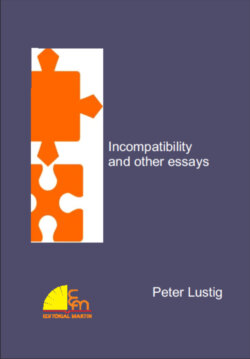Читать книгу Incompatibility and other essays - Peter Lustig - Страница 8
На сайте Литреса книга снята с продажи.
I. The Singularity of Selfhood
ОглавлениеGiven the inordinate predicament attained by Freudian psychology, in this day and age, it has become difficult to mark the territory of motivation in terms of an objective appraisal. It is always possible to attribute human behaviour to basic aspects of theory, without taking into account that, while theory involves conceptualization, some facts may be unwittingly overlooked or left out. This reasoning applies as much to the vagaries with which “human nature” is frequently invoked, to sideline complications in the search for causes, as to the deeper implication that certain unflagging principles may, indeed, exist beyond the whimsical realm of personal preference (conscious or otherwise) that determines how choices are made.
Actually, if there really is an ontological basis to the real world, it is hard to accept that there can be room for uncertainty or relativism in connection with available options. One gets the impression that the seemingly aimless digressions in which “science”indulges are only an excuse to cover up ignorance, a temporary face saving procedure to help self-anointed “experts” push forward the deadlines they have set for themselves, in response to public or personal expectations.
But, the fact remains that, while it continues to be considered legitimate to attribute the quality of an objective truth to evaluations made in response to stimuli, it would be wrong to omit a comparison with facts or reasons that are external to the circumstances under consideration. It would be even farther removed from the truth to say that something appears in a certain light because it is being regarded so through a particular lens and that, in reality, how it is seen depends on the colour of that lens. It might as well be said, risking charges of Medievalism, that grasping this “truth” is beyond the scope of the intellect, instead of denying the obvious by shrouding it in mystery.
There remains the question as to how well this “true”world, made up of what amounts effectively to “reality”, can be known and to what extent this actually matters, in view of the tendency to interpret and equivocate, rather than to disengage from subjectivity. How would anybody determine that regard for “truthfulness” can make a difference, if it is known that human nature will normally view any version of reality at a slant? Is it at all possible to consider this contradiction in a single breath? Can anybody make headway toward finding common ground for a compromise, or will convictions invariably take precedence over human lives, when “truths” are at stake? With what is a person left if he has been deprived of the right to exist because his convictions have come into question? Worse still, supposing he was alleged to hold these convictions because he had been assigned a collective identity, where does this leave him as an individual? Is victimization eased through sharing the fate of others, or is there a “moment of truth” when the only thing that counts is what happens to oneself?
The sufferer is always, inwardly, an individual. This is so to the extent that human nature is expected to look askance before a dire plight and “humaneness” under pressure is a virtue attributed to “education” (with or without the support of “reason”) How can“unselfishness”, or even “selflessness”, be explained while human nature is described as essentially self-centred? Does this not suggest there must be something “real”out there that belies “human nature”? If so, what are the chances that there may be no such “human nature”, but any number of possible choices regarding behaviour, with or without the benefit of “education”, and even before attaching a reason to these choices?
It is easy to formulate unlimited questions on an issue without coming forward with an answer. Yet, never for a moment can anyone deny that there is a warning note sounded every time interpretation is given the upper hand over attempting to show things as they really are. The danger lies in allowing oneself to be drawn away from a rational approach, though it were only for the sake of getting more attention. It would be useless to try to make heads or tails of something that was not devised for effective communication. So much for “irrationalism”!
The sum total of the arguments conducive to expose the disarray of opinions on an underlying reality, as an outcome of psychological diverseness, rules out any attempt to arrive at an objective assessment. Discussing psychology refers to the subject, not to the object. Despite the convenience, or the usefulness, of focusing on the reasons why some people do certain things, a study of behaviour can never explain away its external motivating agents, as if they only existed as an excuse for self-delusion and were not at all real themselves. The unavoidable conclusion suggests that psychology and ontology are separate fields that do not intersect and they must be dealt with accordingly.
